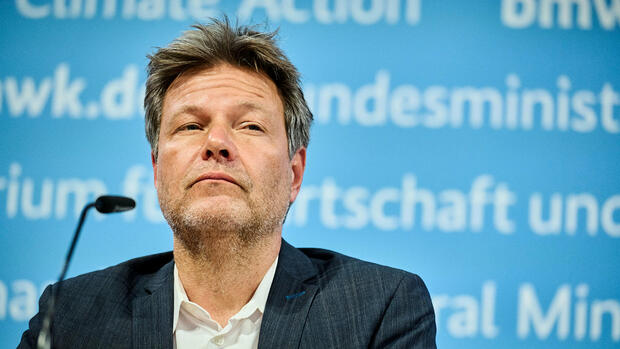The Economics Minister indicates that he does not necessarily want to stick to the starting date for a heating ban.
(Photo: IMAGO/Mike Schmidt)
Berlin The reform of the Building Energy Act (GEG) is getting closer, but there are new discussions about the schedule for the new rules for heating systems. Economics Minister Robert Habeck (Greens), coalition partner FDP and industry representatives now consider a later start than 2024 to be conceivable.
The draft law, which Habeck and Building Minister Klara Geywitz (SPD) brought through the cabinet, stipulates that from 2024 every newly installed heating system should be operated with 65 percent renewable energy. Parliament will debate for the first time at the end of May. The final vote is due in June.
>> Read also: This comes with the heating ban on homeowners
But the start date is finding more and more critics. “We need a heat transition from a single source,” said Kerstin Andreae, general manager of the Federal Association of Energy and Water Management BDEW on Tuesday. “The goal must be a mature and realistic overall concept for a climate-neutral heat supply.”
For the BDEW, such a concept also includes municipal heat planning. In this way, local energy potential, existing infrastructure and local consumption should be optimally tailored to one another.
District heating instead of new heating?
For example, homeowners would be able to tell whether a municipality is planning to supply heat via a district heating network. Then the investment in a heat pump could be superfluous. Rather, homeowners could have their old oil or gas heating system repaired until connection to a district heating network is possible.
>> Read here: District heating as an alternative heating: It is so attractive for homeowners
With the reform of the building energy law, the farewell to gas and oil heating is to be initiated. However, it expressly provides that existing oil and gas heating systems can continue to be operated and that broken heating systems can be repaired. Transitional periods apply.
“The heat transition is too important and far-reaching to act hastily,” Andreae continued – but without setting a start date. It is not decisive when exactly the law comes into force, according to the former economic policy spokeswoman for the Greens in the Bundestag. The legislator should now take the time that is necessary to put together a package in dialogue with business and society.
FDP considers a later start conceivable
The German Chamber of Industry and Commerce (DIHK) was also skeptical about the planned start in 2024. “In view of delivery problems and the lack of skilled workers for the installation of new heating systems, longer transition periods would be advisable from the companies’ point of view,” said DIHK energy expert Sebastian Bolay “New Osnabrück newspaper”.
>> Read here: How the law on heating replacement could be improved
According to FDP parliamentary group leader Christian Dürr, a later start date than 2024 is conceivable. “We will not pass any law that leaves questions unanswered,” Dürr told the Funke Group newspapers. For example, he called for openness to technology when choosing the heat source when the heating is replaced.
The energy policy spokeswoman for the SPD parliamentary group, Nina Scheer, emphasized that her party would insist on fair and adequate structuring of the subsidies during the consultations. “The consultations will show whether this will also affect the schedule.”
Economics Minister Habeck indicated at the weekend that he would not necessarily stick to the fact that the new building energy law will take effect from next year. The coalition committee decided on 2024, Habeck told Deutschlandfunk.
With a view to the parliamentary deliberations in the Bundestag, he also said that it was “of course just as relevant to think about whether you start later or start a little later”. He added: “I’m as pragmatic as possible at this point.”
More: This is how the heating exchange works
